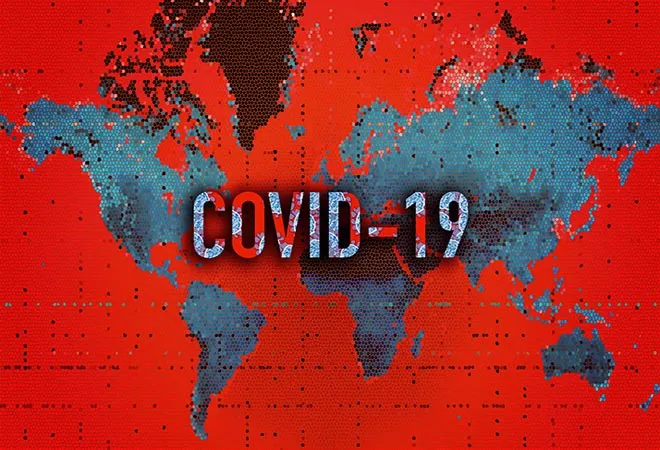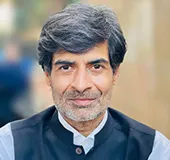
It is unfortunate that the coronavirus pandemic should have plagued the international community at its weakest moment, where national politics and economic parochialism are upending the idea of “one global village”. As Professor Sridhar Venkatapuram correctly notes, we take issue with the current state of the international order in our book, The New World Disorder & the Indian Imperative. It is not the values and norms that it ostensibly professes that we take objection to, but the means through which they have been devised, exercised and often betrayed.
Among the many crises of global governance we document, two, in particular, stand out in regard to this new pandemic. First, the waning legitimacy of international institutions. The WHO’s response to the outbreak, with its indulgence of the official Chinese line for far too long, is an important case in point. Many of our global institutions and their agencies suffer from politicisation, manipulation and a lack of representation, independent leadership and purpose. The second crisis relates to national sovereignty, and its resurgence amidst the wave of nationalism sweeping the world.
Headlines from around the world bear testament to these symptoms. The Trump administration’s “America First” instinct has seen it attempt to source a vaccine for the American people alone from Germany, to cancel pharmaceutical imports from China and to stymie global consensus on the response by insisting on the divisive “Wuhan virus” formula at the G-7 and, currently, at the UN Security Council. Beijing, meanwhile, has got away with letting the virus loose, handling it initially in an opaque manner, and manipulating the institutional architecture that should have responded to it. It is now attempting to play saviour by supplying emergency medical equipment to the world and emergency medical teams to Italy. Experience suggests that nations will pay for this help with silence on China’s misdemeanours. Even the EU has struggled to support its member states in their worst public health emergency in modern history.
We can only look on with disappointment as the thesis of our book plays out in real-time, with such fatal consequences. Our sweeping critique of global governance should not lead to the mistaken conclusion that it is a futile enterprise. Here, we’d like to engage with Professor Venkatapuram’s criticism that our book does not “go into how the global order creates and distributes health risks like COVID19”. It is, in fact, the recognition of the interdependence and shared resilience — and fragility — of our global society that prompted us to undertake this exercise. Had global governance been working effectively, the world would have identified the coronavirus as soon as it emerged; sounded a global alarm earlier about its dangers; and publicised the best practices that should have been adopted by all countries to prevent or limit its spread. That this did not happen is a damning indictment of the state of our new world disorder.
Had global governance been working effectively, the world would have identified the coronavirus as soon as it emerged; sounded a global alarm earlier about its dangers
As our book demonstrates, the coronavirus is far from the first global bug to have bitten us, nor will it be the last. In 2001, we learnt that anger and malice in Afghanistan could take down skyscrapers in New York. The year 2008 saw dormant financial malpractices in the US rapidly metastasise into a global financial crisis. In 2016, Russia tried to register itself in the voter rolls for the US elections. It is clear to us that the sheer complexity and immeasurability of our interdependence requires more global governance, not less.
This perspective also informs the subtext of our book, “the Indian imperative”. The coronavirus outbreak has drawn attention to what these imperatives are in the decades ahead. The first, is providing for our people. India’s vast, mostly undocumented and migrant informal workforce, is already suffering the heaviest damage from the economic fallout. Professions that are predominantly underpaid and unprotected will be collaterals. We remain hopeful that the Indian government and its society will see in this crisis an opportunity to resolve the many socio-economic inequities that plague our country.
This leads us to the second imperative: To use these domestic experiences and policy lessons to shape India’s international engagement. The pandemic has accentuated the governance challenges confronting most emerging economies. Responding to their needs presents India the opportunity to be a very different type of power. The source of the US’ power was its vast geopolitical network of military and diplomatic alliances and economic institutions. China’s rise, on the other hand, was facilitated by its geo-economic power and control over supply chains and trade. As we argue in our book, India will likely be the world’s first development power- with its rise being linked to its ability to provide governance solutions to the development needs of millions from Asia and Africa.
It is also incumbent on India to reboot the ethic of global cooperation. The world is slipping into spheres of influence of exclusive arrangements, limiting our ability to respond effectively to global challenges. India’s early outreach to the SAARC community and its proactive role in the G20 demonstrates that it remains adept at navigating ideological-political diversity comfortably, something it needs to do at home too.
India’s early outreach to the SAARC community and its proactive role in the G20 demonstrates that it remains adept at navigating ideological-political diversity comfortably, something it needs to do at home too.
The coronavirus epidemic is a devastating reminder of the consequences of disorder. It is also a timely memo to sovereign states that the re-assertion of sovereignty must not imply an abandonment of global responsibilities. When the current pandemic is over, the globe must learn lessons about what happened, and how international systems and institutions can be strengthened and radically reformed in order to forestall its recurrence.
Many will find in this pandemic an opportunity to close themselves off to the international community. India must defy such impulses. If anything, Indian leadership in these times — and a new resolve for global governance — may be just the vaccine that the international community needs to navigate a new decade.
Buy
The New World Disorder and the Indian Imperative here.
This essay originally appeared here
The views expressed above belong to the author(s). ORF research and analyses now available on Telegram! Click here to access our curated content — blogs, longforms and interviews.




 PREV
PREV


